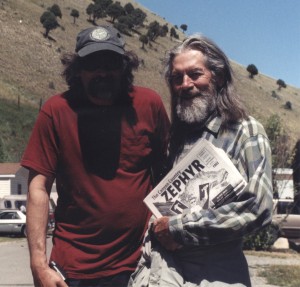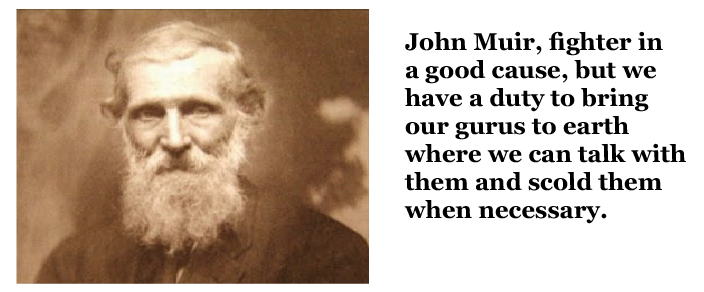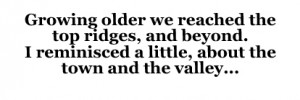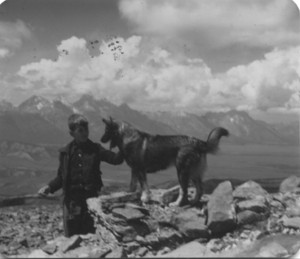Last summer Jim Stiles and Bob Greenspan and I met in Jackson, Wyoming. Bob and I favored crossing the street to a cafe for coffee, but Jim led us to a shady outside bench and we sat there quite a while talking about the state of the world, looking across the quiet waters of Flat Creek and the burbs of the jammed-up tourist town to the west-facing slope of a mountain I once thought of as home territory. Jackson kids, we struggled up its steep, dry slopes looking for arrowheads, for whatever new and exciting might show up.
Sometimes it did. Growing older we reached the top ridges, and beyond. I reminisced a little, about the town and the valley. Jackson Hole once advertised itself as “The Last of the Old West.” Jim and Bob had ideas about current jargon concerning “The New West” and “The Old West.” Naturally, Ed Abbey came into it, his wonderful rants, his rebel style. We drifted into the subject of honest argument, its value as an antidote for empty rhetoric, or evasion. Abbey’s last novel, A Fool’s Progress, was subtitled, An Honest Novel.

It was a good occasion, our little confab in Jackson, compadres comparing notes, catching up on things. The world has moved along, since then, bringing tragedy and, by way of drama and fanfare, torrents of dishonesty. Lies, actually. Lies. All last winter this thought kept dogging me: if we Americans don’t learn to talk and listen to each other without pulling punches, the road ahead will get hellishly, downwardly steep. And so, in the spirit of “Take it or Leave it,” on this beautiful day in mid summer, I offer for discussion a shortened version of a chapter in my new book. The chapter is called “In the Spirit of Argument.” It goes something like this:
Nature writing. So often it goes flat. Why? I want to look at one of the ways.
Here’s John Muir:
“… the deep bass tones of the fall, the clashing, ringing spray, and infinite variety of small low tones of the current gliding past the side of the boulder-island and glinting against a thousand smaller stones down the ferny channel! … The place seemed holy, where one might hope to see God.”
(My First Summer in the Sierra, 1911).
I like this poetic word play; it resonates, until turning suddenly sacred, jumping into an aura of hope of seeing Him. Writing of this sort, and it’s common, expresses a split vision, grants neither God nor nature a fair shake. There’s a fair amount of that in Muir’s Sierra writing:
“It would seem impossible that any one…could escape the Godful influence of these sacred fern forests.”
But a shepherd, passing through, did escape. At least, Muir thought so. The shepherd, “betraying no more feeling than his sheep,” said, “Oh they’re only damned big brakes.” I have to wonder about that. Was the shepherd, being a little sly, intuiting that his esthetic or religious I.Q. was being tested? I don’t know, but the varmentalist in me objects to ranking anyone on such scales.We’re still doing it, acting as if our sensitivities cover well enough the farflung range of human attitudes, pleasures, judgements.

I’m afraid there’s more to say about Muir’s ranking habits. In an amazingly obnoxious paragraph he casts fastidious scorn on an Indian woman who had ventured into his spotless wilderness. “Her dress was calico rags, far from clean…Had she been clad in fur, or cloth woven of grass or shreddy bark…she might then have seemed a rightful part of the wilderness; like a good wolf at least, or bear.” (My italics). He called her “debased.” It’s an old story by now, wilderness people contrasting nature, innocent and clean, with degraded humankind.
John Muir, fighter in a good cause, but we have a duty to bring our gurus to earth where we can talk with them and scold them when necessary. Yes, even Thoreau, who griped about his neighbors’ inability to take time out and gather spiritual sustenance. However, he did pay some attention to the circumstances of lives.
“How many a poor immortal soul have I met…creeping down the road of life, pushing before it a barn seventy-five feet by forty, its Augean stables never cleaned, and one hundred acres of land, tillage, mowing, pasture, and wood-lot! The portionless, who struggle with no such unnecessary inherited encumbrances, find it labor enough to subdue and cultivate a few cubic feet of flesh.” (Journal, XVI).
Keeping one’s life going day by day is an accomplishment. Evolution equipped us for struggle, and struggle it is, in cities or outbacks, drawing on spiritual grit aplenty. We live by challenge and response, taking of happiness and inspiration when the path happens to be one with openings, pauses. If not, not.
Circumstances would seem to be essential if we’re picking up the challenge of thinking about someone else’s life. Why then do professional environmentalists carelessly scatter invites to wilderness…therapy, adventure, esthetic pleasure…without considering the circumstances of those who might throw those invites away, in disgust? Are we committed only to those who already agree and who need only a periodic nudge?

When a Right-to-Life blockader told me he read the entire Bible, front to back, every year, I quit the discussion, such as it was. His life had become a program, locked tight. Later I asked myself about my own ways. Do I too go around with a clamshell mind? I know this much for sure, that a big share of the openings this mind of mine has undergone came from meeting other minds in more than a passive or one-way manner. That is to say, by argument, which leads me to favor an argumentive way of life, of the back-and-forth kind: listen-talk-listen-talk. When that happens we are testing theories, notions, guesses, heartfelt emotion. Trouble is, occasions for that are not common. I say we ought to learn how to create more of them.
And so, a plea for argument. Allow it, get used to it, open up, mix in. Know when to back off, that too. Let’s bring our causes out of the dark, into the glare cast by those who do not agree, and those who are so wrapped in self concerns they don’t even bother to disagree, and those who have their own causes, all of which, ours included, are a bit crazy, and no wonder, considering the situation. If we learn to do it right, we might build a mighty…no, not a program, please. You know the word, we’ve been spouting it for more than 200 years, here on this continent. Okay, pause for praise: a solid foothold has been established, in the foothills.
To read the PDF version of this article, click here.
Don’t forget the Zephyr ads! All links are hot!





